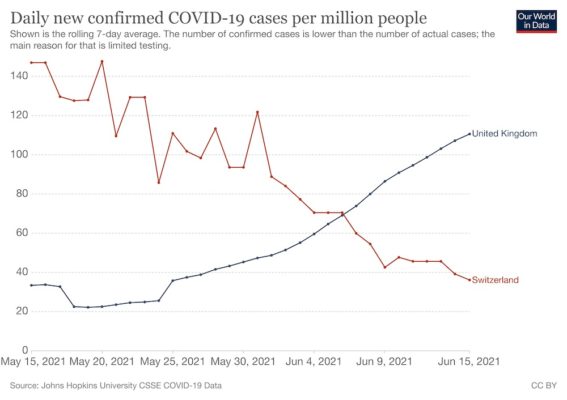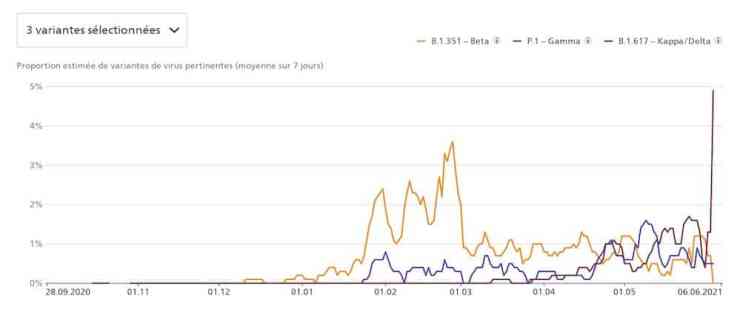| The number of Covid-19 cases in Switzerland continues to fall. On 15 June 2021, 243 new cases were reported. A month earlier the 7-day average was 2,161 cases. Swiss cases have dropped by 89% in a month.
In the UK the number of cases has roughly tripled over the same period and the government has decided to extend current restrictions until 19 July 2021. Why is there such a large difference in the number of new Covid-19 cases in the two countries? |
Coronavirus Data Explorer, May and June 2021 |
VariantsThe first difference is Covid-19 variants. In the UK the Delta variant, which first emerged in India, makes up more than 90% of new cases in the UK. Tim Spector, who manages the large Zoe database of Covid-19 data in the UK says recent estimates suggest that the Delta variant is twice as contagious as the original variant and has an R0 of 6, which means an average infected person will infect 6 others. In the UK, much of the recent rise in cases is among the unvaccinated and younger age groups, with the infection rate among 20-29 year olds more than doubling in a week. And while the risk of death for this group is low (<0.1%), an average 29-year old man with no underlying health conditions has a 2.7% change of needing hospital treatment. Prof Spector also points out the relatively high risk of long Covid in this age group. Research presented by the NY Times suggests that 19% of asymptomatic patients have long Covid symptoms. |
|
| In Switzerland, the Kappa and Delta variants made up 4.9% of new cases on 3 June 2021, a percentage that leapt from 1.3% a day earlier, suggesting rapid growth of this fast spreading variant. Over time dominant variants eclipse slower spreading ones.
Lower prevalence of the Delta variant in Switzerland could explain some of the difference in case numbers between the UK and Switzerland. |
Covid 19 Virus Variants Segmentation, June 2021 |
Vaccination rates and doses
In Switzerland, the vaccination rate among 20-29 year olds, an age band with a steeply rising infection rate in the UK that is largely driving the rise in cases, is around 40 doses per 100. In the UK, the rate of vaccination among this group is similar to the Swiss rate.
The UK data suggest second vaccine doses are important. Rising cases in the 50-59 year old age band, among which many have had one dose but not two, combined with a more muted rise among those 60 and over, who have had two shots, suggest that the second shot boosts protection against the Delta variant. Research backs up this observation.
A combination of relatively low vaccination rates and even lower numbers of people who have had two doses in the 20-29 age group might explain why cases are growing so fast in the UK. Given that Swiss vaccination rates for this age group are similar, if the Delta variant gets away, Switzerland’s new case data might start to resemble the UK’s.
The two nations are using different vaccines. Switzerland is using only the Pfizer and Moderna mRNA vaccines. The UK has been using these two plus the AstraZeneca vaccine, which accounts for around 60% of its total vaccinations.
And while the efficacy of these vaccines seems to be similar against the Delta variant after one dose (33%), it varies after the second dose. After the second dose the Pfizer vaccine is 88% effective compared to 60% for the AstraZeneca vaccine – based on research by Public Health England. The study did not cover the Moderna vaccine.
In Switzerland, around 27% of the population has received two doses of vaccine. In the UK the same rate is 45%.
Different symptoms
Prof Spector reports that Covid-19 symptoms appear to be changing. Symptoms from the Delta variant are now more likely to resemble a cold. A headache and runny nose are more likely than before. The widely reported loss of smell associated with earlier variants doesn’t make the top 10 most common symptoms now said Spector. Since the beginning of May 2021, the top symptoms have been headache, sore throat, runny nose and fever, he said.
Avoiding a resurgence in Switzerland
It is likely that the main difference between new cases in Switzerland and the UK is down to differences in the prevalence of the Delta variant, 5% versus more than 90%.
Switzerland’s best chance of avoiding a resurgence of Covid-19 cases like the UK appears to hinge on vaccination and containing the Delta variant. Switzerland may have a vaccine advantage due to its decision to only use the two mRNA vaccines, but this only materialises when people are vaccinated, not once but twice. On this metric Switzerland is far behind the UK – 27% versus 45%.
Full story here Are you the author? Previous post See more for Next postTags: Coronavirus Switzerland,Covid-19 Switzerland,Editor's Choice,Featured,Health,newsletter

































